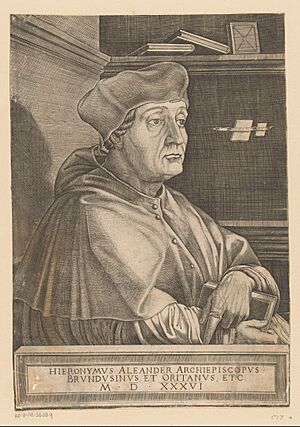Girolamo Aleandro facts for kids
Girolamo Aleandro (born February 13, 1480 – died February 1, 1542) was an important Italian scholar and church leader. He was known as a humanist, which means he loved studying classical literature and art. He was also a linguist, someone who knows many languages, and later became a Cardinal in the Catholic Church.
Contents
Early Life and Education
Girolamo Aleandro was born on February 13, 1480. His hometown was Motta di Livenza in Italy. His father was a doctor.
Young Girolamo studied many subjects. He learned about medicine, languages, and religion. He went to school in a city called Padua.
While in Venice, he met famous scholars. One was Erasmus, and another was Aldus Manutius. People thought Aleandro was very smart. He knew Greek, Latin, Hebrew, and Chaldaean languages.
Moving to Paris and Rome
In 1508, Aleandro moved to Paris, France. King Louis XII invited him to teach. He became a professor of "belles lettres," which means beautiful writing.
From 1513 to 1516, he was the head of the University of Paris. This was a very important job. Later, he worked for a church leader named Érard de La Marck.
This leader sent Aleandro to Rome. There, Pope Leo X asked him to stay. In 1519, Aleandro became the librarian of the Vatican. The Vatican Library holds many ancient and important books.
Role in the Reformation
In 1520, Aleandro went to Germany. He was a special messenger for the Pope, called a nuncio. He attended the crowning of Emperor Charles V.
He was also at the Diet of Worms, a big meeting. Here, he strongly opposed Martin Luther. Luther was a reformer who wanted to change the church. Aleandro believed Luther's ideas were wrong.
He pushed for strict rules against Luther. The emperor and the meeting agreed to his plan. After this, Aleandro went to the Netherlands. He was involved when two monks were executed. They were burned in Brussels for supporting Luther's ideas.
Church Leadership and Later Life
In 1524, Pope Clement VII made Aleandro an Archbishop. An archbishop is a high-ranking church leader. He became the Archbishop of Brindisi.
He was then sent to France as the Pope's messenger. He was captured during a battle in 1525. He was released after a large payment.
Aleandro continued to work for the Pope. He went on missions to Germany. He tried to stop German princes from making peace with the reformers. He also tried to slow down the spread of new religious ideas.
In 1536, Pope Paul III made him a Cardinal. This is one of the highest ranks in the Catholic Church. He officially became a Cardinal in 1538. His church in Rome was San Ciriaco alle Terme Diocleziane.
Aleandro stopped being Archbishop of Brindisi in 1541. He died in Rome on February 1, 1542. He was first buried in Rome. Later, his body was moved to his hometown. He was re-buried in the Church of San Niccolò.
His Writings
Girolamo Aleandro wrote several important books. He created a Greek-Latin dictionary in 1512. He also wrote a Greek grammar book in 1509. This book helped people learn Greek.
He also helped publish Greek texts. These included works by Isocrates, Plutarch, and Lucian. Some of his Latin poems were also published.
The Vatican Library has many of his letters. These letters are important. They tell us a lot about the Reformation and Counter-Reformation. These were times of big changes in the church.
See also
 In Spanish: Girolamo Aleandro para niños
In Spanish: Girolamo Aleandro para niños
- Hochstratus Ovans
Sources
 | John T. Biggers |
 | Thomas Blackshear |
 | Mark Bradford |
 | Beverly Buchanan |


